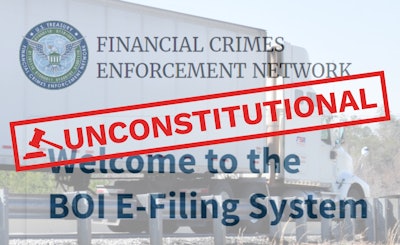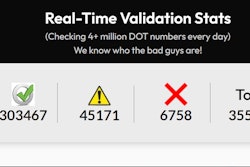
Updated December 28, 2024:
An injunction against implementation and enforcement of the Corporate Transparency Act been put in place again as of Friday, December 27, following the ruling of a three-judge panel of the 5th Circuit federal appeals court in New Orleans. A prior three-judge panel had felt the U.S. Treasury was likely to ultimately win the appeal of a judge's ruling the CTA unconstitutional, and thus ordered the implementation timeline for the required filing of Beneficial Ownership Information by small businesses to continue.
Yet this latest judgement as of Friday stays that panel's order that U.S. Treasury should go forward with implementation.
Treasury's Financial Crimes Enforcement Network (FinCEN) is the entity to which owner-operators and other small fleets (registered with their secretaries of state) are required to report ownership information in what is a fairly simple process, as detailed earlier in the year -- FinCEN, however, will continue to be enjoined from implementation of the requirement as courts sort out the challenges to rule.
Below find prior updates and more information on the legal challenges to the rule. Know that, however, as of this update December 28, owner-operators and other covered small businesses are not required to file.

FinCEN's December 23 update:
In light of a December 23, 2024, federal Court of Appeals decision, reporting companies, except as indicated below, are once again required to file beneficial ownership information with FinCEN. However, because the Department of the Treasury recognizes that reporting companies may need additional time to comply given the period when the preliminary injunction had been in effect, we have extended the reporting deadline as follows:
- Reporting companies that were created or registered prior to January 1, 2024 have until January 13, 2025 to file their initial beneficial ownership information reports with FinCEN. (These companies would otherwise have been required to report by January 1, 2025.)
- Reporting companies created or registered in the United States on or after September 4, 2024 that had a filing deadline between December 3, 2024 and December 23, 2024 have until January 13, 2025 to file their initial beneficial ownership information reports with FinCEN.
- Reporting companies created or registered in the United States on or after December 3, 2024 and on or before December 23, 2024 have an additional 21 days from their original filing deadline to file their initial beneficial ownership information reports with FinCEN.
- Reporting companies that qualify for disaster relief may have extended deadlines that fall beyond January 13, 2025. These companies should abide by whichever deadline falls later.
- Reporting companies that are created or registered in the United States on or after January 1, 2025 have 30 days to file their initial beneficial ownership information reports with FinCEN after receiving actual or public notice that their creation or registration is effective.
- As indicated in the alert titled “Notice Regarding National Small Business United v. Yellen, No. 5:22-cv-01448 (N.D. Ala.)”, Plaintiffs in National Small Business United v. Yellen, No. 5:22-cv-01448 (N.D. Ala.)—namely, Isaac Winkles, reporting companies for which Isaac Winkles is the beneficial owner or applicant, the National Small Business Association, and members of the National Small Business Association (as of March 1, 2024)—are not currently required to report their beneficial ownership information to FinCEN at this time.
Original December 5 story follows:
Last week in a federal district court in Texas, Judge Amos Mazzant enjoined the United States Treasury from implementation and enforcement of the Corporate Transparency Act, which was signed into law in 2021 as part of that year's Defense reauthorization package.
The Act aimed at the problem of money laundering from abroad and at home through shell companies. As Overdrive readers have been aware of since early in the year, the CTA set up a reporting system for small business LLCs and corporations (established through Secretaries of States' systems) to report so-called "beneficial ownership" identity information to the U.S. Treasury's Financial Crimes Enforcement Network (FinCEN).
Big deadlines for required filings -- with stiff penalties for not filing -- loomed at the end of this month for long-established businesses, yet Judge Mazzant's December 5 ruling in Texas Top Cop Shop, et al v. Merrick Garland puts that deadline on hold in favor of arguments against the very constitutionality of the law. The suit was brought by the named plaintiff, a seller to law enforcement in Texas, and five others, including the National Federation of Independent Business, suing on behalf of its membership.
"The BOI reporting requirements are a harmful invasion of small business owners’ privacy and a misuse of their valuable time," said NFIB's Beth Milito, executive director for its Small Business Legal Center. "Thankfully, the Court agreed and granted a preliminary injunction, giving small business owners a reprieve from this burdensome rule.”
As Judge Mazzant wrote in granting plaintiffs' request for an injunction halting the law's implementation, "While the Court defers to Congress on matters of policy, interpretation of the Constitution is an area where Congress enjoys no authority." Mazzant's not the first judge to rule against the act, as a district court in Alabama in May was first to declare the law unconstitutional, following a suit brought by the National Small Business Association with a named plaintiff as member.
[Related: Federal finance-crimes networks reporting requirements for biz 'unconstitutional': Court]
Relief from the law's owner-info-reporting requirements was applied only narrowly as a result there, including just the named plaintiff and NSBA members. Yet with this new order, FinCEN's website acknowledges broad relief as long as the order remains in effect.
"In light of a recent federal court order, reporting companies are not currently required to file beneficial ownership information with FinCEN and are not subject to liability if they fail to do so while the order remains in force," FinCEN noted. "However, reporting companies may continue to voluntarily submit beneficial ownership information reports."
FinCEN said it felt the CTA "plays a vital role in protecting the U.S. and international financial systems, as well as people across the country, from illicit finance threats like terrorist financing, drug trafficking, and money laundering."
FinCEN and Treasury were swift with an appeal, filed the same day as the ruling, December 5, FinCEN said.
As the case plays out, deadlines for filing and penalties for not doing so will remain on hold, yet FinCEN noted its reporting system for small businesses will remain functional for voluntary filings in anticipation of the law remaining in effect long-term, potentially. It's unknown whether the FinCEN/Treasury appeal will be successful, likewise whether, if the injunction were to be lifted after the original end-of-year deadline, enforcement of the reporting requirement might be at all retroactive for owners who take advantage of relief from filing.
FinCEN/Treasury representatives have yet to respond to Overdrive inquiries about the potential for retroactive enforcement.
If the judge's ruling holds past the end of the Biden Administration's tenure and Trump's Justice Department declines to carry on with the appeal, though, Judge Mazzant's arguments against the CTA could force Congress back to the drawing board. His interpretation in the ruling against the CTA hinges on constitutional principles. As Mazzant wrote in his ruling:
At its most rudimentary level, the CTA regulates companies that are registered to do business under a State’s laws and requires those companies to report their ownership, including detailed, personal information about their owners, to the Federal Government on pain of severe penalties. Though seemingly benign, this federal mandate marks a drastic two-fold departure from history. First, it represents a Federal attempt to monitor companies created under state law -- a matter our federalist system has left almost exclusively to the several States. Second, the CTA ends a feature of corporate formation as designed by various States -- anonymity. For good reason, Plaintiffs fear this flanking, quasi-Orwellian statute and its implications on our dual system of government. As a result, Plaintiffs contend that the CTA violates the promises our Constitution makes to the People and the States. Despite attempting to reconcile the CTA with the Constitution at every turn, the Government is unable to provide the Court with any tenable theory that the CTA falls within Congress’s power. And even in the face of the deference the Court must give Congress, the CTA appears likely unconstitutional. Accordingly, the CTA and its Implementing Regulations must be enjoined.
NFIB's Milito called the judge's ruling ultimately a "huge victory for small businesses nationwide, and just in time. For many Main Street small businesses, they were a mere four weeks away from the deadline to file their information in accordance with the CTA."










